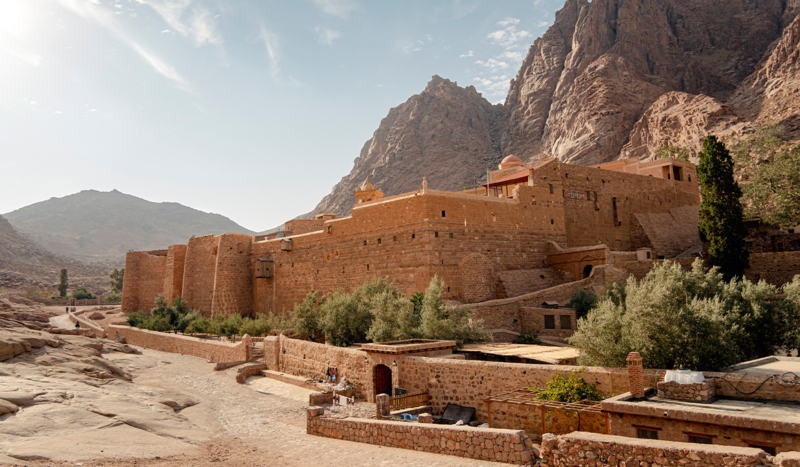
St. Catherine's Monastery / Adobe Stock
A Texas-based religious freedom professor provided an analysis this week of the situation surrounding an Egyptian court’s decision that the country’s government owns the 6th-century Greek Orthodox Monastery of St. Catherine at Mount Sinai. The decision has sparked concern across much of the Christian world.
CatholicVote previously reported on the late May ruling that prompted a meeting between Egypt and Greece’s foreign affairs ministers.
Greece’s foreign affairs minister George Gerapetritis said after the meeting that he and Egypt’s foreign affairs minister Badr Abdelatty “agreed to work in the immediate future toward securing the rights of the monastery, as well as its legal status,” and “to move forward based on the centuries-old tradition….” Although they are still allowed to be at the monastery with restrictions, the monastery’s monks had decried the court’s decision as a “de facto expulsion.”
In Paul Marshall’s analysis in a June 4 article for Religion Unplugged, he explained that tradition holds that the monastery is situated at the mountain where God gave Moses the Ten Commandments and includes a tree in its walls that “is reputed to be the burning bush from which God spoke to Moses.” Its library contains ancient documents, such as the oldest complete copy of the New Testament in Greek.
“This issue is especially explosive because St. Catherine’s is arguably Christianity’s most important monastery — but the situation also appears to be complex,” wrote Marshall, who is a Wilson professor of Religious Freedom at Baylor’s Institute for Studies of Religion.
The monastery’s status “is complicated by the fact that, because of its origins in Byzantium, it is a Greek Orthodox monastery, and its status is subject to ongoing negotiations between the Egyptian and Greek governments, discussions which continue into 2025,” Marshall explained.
An agreement drafted in December 2024 would have clarified that the monastery and its plots are property of the Greek Orthodox Doctrine and could remain autonomous in its internal, administrative, and religious actions overseen by the abott, who would cooperate “with Egypt’s Supreme Council of Antiquities for conservation of buildings,” Marshall wrote.
However, the agreement was never signed.
In a visit to Athens in May before the court ruling, Egyptian President Abdel Fattah el-Sisi referenced the agreement.
Marshall argued that after the ruling, the president “will not want to be embarrassed by having his statements in Athens undercut.”
According to Marshall, after concern arose from the court ruling, the president’s office and the minister of foreign affairs both expressed that the ruling “has been widely misunderstood.”
In a statement, the president’s office emphasized that it is “[fully committed] to preserving the unique and sacred religious status of St. Catherine’s Monastery and to ensuring that this status is not violated.”
A spokesperson for the Ministry of Foreign Affairs also issued a statement explaining that the court’s decision, relating to the monastery’s ownership of 71 disputed plots of land, “referred to the existence of some remote areas within the natural reserves that are completely distant from the monastery and uninhabited, for which no ownership or possession documents exist. Consequently, these lands are considered state property.”
The spokesperson also emphasized that the court ruling does not infringe on the monastery’s archaeological sites, spiritual value, cemeteries, and religious significance, and that the monks are approved to “benefit” from the areas around the monastery.
However, the monastery’s legal representative argued that the ruling essentially leaves the monastery without property, according to Marshall.
While the issue remains open-ended and unresolved, both countries appear poised to resolve the concerns and retain friendly relations, according to Marshall, who added that “given Egyptian-Greek common interests, especially on vital oil and other mineral rights in the Mediterranean, also subject to recent agreements, there is great pressure to resolve the matter amicably.”

